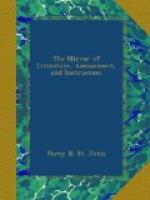During the reigns of Charles II., and James, his successor, the principal nobility held frequent meetings in a subterraneous vault beneath this house, for the purpose of ascertaining the measures necessary to be pursued for reestablishing the liberties of the kingdom, which the insidious hypocrisy of one monarch, and the more avowed despotism of the other, had completely undermined and destroyed. It is reported also, that the principal papers which produced the revolution of 1688, were signed in the dark recess at the end of the vault. These circumstances have been recorded by Mr. Wilcox, in an inscription written at the extremity of the vault, which, on account of the above circumstances, was visited by the Prince of Orange after he had obtained the crown; by General Paoli in the year 1780; and by George III. on the 14th of November, 1785.
The Lovelace family was ennobled by Charles I., who in the third year of his reign, created Richard Lovelace, Baron Hurley, which title became extinct in 1736. The most valuable part of the estate was about that time sold to the Greave family and afterwards to the Duke of Marlborough: the other part, consisting of the mansion house and woodlands, to Mrs. Williams, sister to Dr. Wilcox, who was bishop of Rochester about the middle of the last century. This lady was enabled to make the purchase by a very remarkable instance of good fortune. She had bought two tickets in one lottery, both of which became prizes: the one of 500_l_., the other of 20,000_l_. From the daughter of Mrs. Williams it descended to Mr. Wilcox in the year 1771.—Beauties of England and Wales.
P.T.W.
* * * * *
SPIRIT OF THE PUBLIC JOURNALS.
CLAVERING’S AUTO-BIOGRAPHY.
Containing opinions, characters, &c. of his Cotemporaries.
Shelley had some excellent qualities: I attribute his eccentricities to a spice of insanity. He often wrote unintelligibly;—sometimes in short lyrics, beautifully. The ashes of him and Keats sleep together in the Protestant chapel at Rome. I am resolved once more to visit Lirici, where the funeral pile of his relics were lighted. I am never so happy as when I am travelling on the Continent; the mere change of air, and locomotion, gives me vigour. I saw old Sir William Wraxall at Dover, a few days before he died, and meant to have accompanied him to Paris. He was still full of anecdote, to which it was necessary to listen with caution; but his information was often curious and valuable. He was one of our oldest litterateurs.




